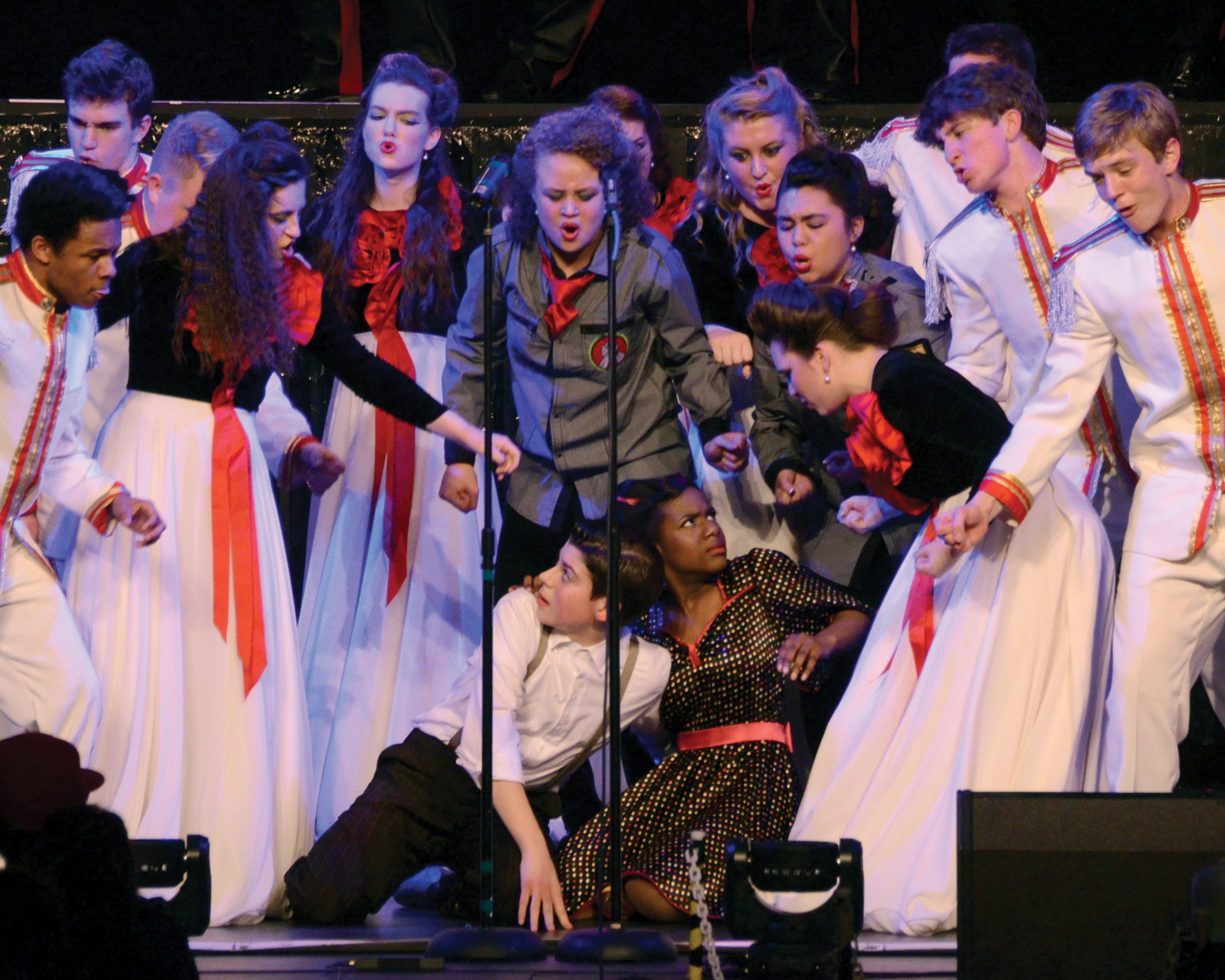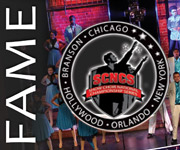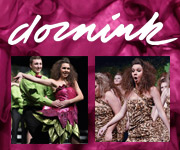
Promoting Student Leadership and Teamwork
Carly Schwarm will be a senior starting her 5th year of Choraliers; she’s also the Dance Captain and one of two Student Directors. Schwarm notes that part of their show choir family is about building each other up, and students are encouraged to be part of choir leadership. They even have an SLC, Student Leadership Committee, which gives students in the group the opportunity to “have a say on decisions made within the group.”
Paul Otten, Superintendent of Schools in the Fairfield City School District, has both personal and professional ties to the Fairfield choirs, since his oldest daughter was briefly a member of Rhythm Express. Otten applauds Director Jeff Clark’s tremendous level of dedication. Otten states, “As the superintendent of the district, I am always searching for individuals who want to give fully of themselves to their students and Jeff is one of those individuals.” Otten shares that Clark demands students’ dedication and best efforts, yet he always brings his own best each day as well. “Coaches do their best to prepare their athletes and work even harder to make sure that they are not ‘out-coached’ by their opponent,” Otten notes. “Jeff does the same; he prepares his singers to compete at the highest level but also makes sure that the other directors don’t ‘out-coach’ him.”
Sam Chenoweth just finished his 7th year involved with the Fairfield show choirs and is attending Ball State University to major in Music Education this fall, a result of Clark’s influence and mentorship. “Seven years ago I didn’t even know what show choir was, but now it is what I want to spend the rest of my life doing,” he adds. He notes that Fairfield distinguishes themselves through their motivation and drive but also gives a great deal of credit to “upperclassman leadership.”
Parent Jennifer Bernard also praises Clark for starting every new year with “Camp Clark,” where the Choraliers spend a week at a campground without any electronic devices. They are there to bond and focus on the group and each other. Bernard says she can see the students changing in just days. “They are annoyed at first because they can’t have their phones, but by the end of the weekend they wish they could stay longer. They understand that they are a team, and it takes them doing their best, along with our amazing combo and tech crew, to put on an unforgettable show.”
The Swing Kids Show: (The Infamous “Holocaust Show”)
Recently, Director Jeff Clark wanted to do something different- even daring, something with a message that mattered. The Swing Kids were a group of teenagers in1930s Germany who admired Swing and Jazz music and used their counter-culture status to oppose the “Hitler Youth” and National-Socialist ideology. Clark planned a thought-provoking show that highlighted these brave youth from another era who worked against persecution and toward tolerance by using the power of music.
Though many wrongly refer to this as the “Holocaust show,” that idea is very misleading, according to Clark. He wanted to do something “meaningful” and “challenging,” and the show on the Swing Kids fits both criteria. He knows it’s also described and viewed as “dark,” and he is careful that he doesn’t take that direction in every future show. He also isn’t trying to be “artsy, risky, or depressing,” and he has no intention of designing all his shows around an agenda. Instead, his goal is to always be progressing in some way. As with life, he knows balance is the key: balance and “a fuller life experience” for his students and his audiences.
Parent J. Brian James notes that The Final Stand (Swing Kids show) required that the kids “act the show” and “put themselves in the shoes of the Swing Kids.” He speaks of one teaching tool used by Clark, which had students reading letters from the kids of this era, and he shares how these students were able to bring that “raw emotion” to the performance, which made this about “so much more than singing and dancing.” The Final Stand asked these students to “consider what they stand for,” with Clark using this as a vehicle to avoid repeating a dark history. “The underlying theme,” James shares, “was the fact that it is easy to be meek and go along with the crowd, but it takes courage and emotion to stand up for what you believe in.”
It was discouraging to hear people call it the “Holocaust Show,” James adds. Though he acknowledges the Prison Camp Scene was a “powerful image,” what he believes to be far more powerful “was the fact that kids realize the situation and, instead of giving up, they decide to ‘Sing it for the World!'”
The Swing Kids represent people working against an “unfair regime,” a polarizing moment in history. Students learned about the Swing Kids and studied the holocaust. Each student was assigned one of the historical figures; students “embodied” people from the past and shared their fates in a fashion, learning if their figure ultimately lived or died in a concentration camp. Not only did it offer a cross-disciplinary educational experience for its students, but Clark sees their work with the Swing Kids show as offering a “magical experience with the kids.”
Risking Competition Scores for a Message That Matters
J. Brian James is a Parent Volunteer and Road Manager for Fairfield Choirs. His daughter, Sarah, is in her 6th year. James believes the Choraliers are set apart from other Midwest Show Choirs by “the attention paid to the story as well as the choral work and choreography.” He explains that the shows go beyond just a theme and are “essentially 20 minute Broadway-style productions” where Clark is “taking the idea of Show Choir and pushing the edges.”
Many of Clark’s California influences are familiar with this approach, though admittedly this type of show is far more uncommon in Ohio. “Midwest groups tend to fit a mold,” Clark explains. So, certainly, some thought they “went too far,” and they know they are “pushing the envelope with dark subject matter,” but his focus isn’t on the darkness. It’s on “Acceptance, Tolerance, and Persecution.”
Clark also knows the subject matter has “definitely impacted scores” in some competitions. It’s just so different. Judges have even said they weren’t sure how to judge such a show with their standard evaluative tools. It’s just that groundbreaking and innovative. They are producing and performing what Clark calls a “piece of musical theatre with an evolving plot,” not a series of musical numbers that can be neatly broken down and judged on technical, objective data. The simple fact, one he explained to his students and parents, is that “some people are not going to like this.”
His students and parents responded with a clear message in return: The scores were not all the mattered. What mattered to them was communicating a beautiful message of “acceptance and tolerance.” What Clark stressed for all of his performers wasn’t about reaching careful technical precision and trying to please everyone but about “believing in a storyline.” James shares that many members of their audience loved the show. Rather than describing them as “Different” or “West Cost,” the audience described The Choraliers as “powerful” and “emotional.” Still, James notes, “We had our detractors who thought the show was in bad taste.” James would just ask those same people to watch the show again, with an open mind.
Parent Jennifer Bernard feels the same way. She found The Swing Kids show to be wonderfully unique. “The song choices, choreography, staging and costumes were perfect for telling the story,” she notes. Yet, the public’s reaction was mixed: “Some loved it and some were offended. Our kids knew that they would get mixed reactions to the show, but they were very proud of the show. They loved performing it and it was obvious.”
Student Sam Chenoweth adds that The Swing Kids show had some unexpected “consequences,” but ultimately in a positive way. Chenoweth notes, “The biggest thing that came from it was the changing of a group mentality that had been pretty set in its ways for the last decade. The goal was to win.” Quite frankly, the Fairfield choirs already knew a great deal about winning, as their stats and awards illustrate. They had already reached success in all those areas.
Chenoweth shares that they realized the “goal could not be to win” with this show. “We were telling a really impactful story. Some would understand it and some wouldn’t. Some of those that wouldn’t understand it may be judges. At the end of the day, the most we could do is know that we said what needed to be said through our show.”
Just as importantly, to Clark, is that this show offers a way to discuss modern-day persecution. They talk about issues of discrimination based on race and sexual orientation. They talk about the importance of unity as a culture-as a group of concerned citizens-to overcome societal struggles that we still face daily.
Clark also shares that this work gives them another way to cover this “Diversity” angle that all school systems want to address but few do so in innovative or courageous ways. At Fairfield, they are living the adage of not repeating historical mistakes by making a concerted choice and saying, “This should never happen again.” Though he knows some will consider these shock tactics, Clark notes, “Some people may be offended, but the future’s not written. These are true things that happened.”
Soon-to-be Senior Carly Schwarm loved the Swing Kids show. Though she notes she’s never been a “history buff,” the show allowed her to connect with a time she had never understood before. Schwarm shares, “It put you in the perspective of the Swing Kids and let you walk in their shoes. For me, it was about way more than just performing. It was about getting the message out and ensuring that this never happens again.”
Student David Hunt shares his own personal connections to the theme, but he also points out how moved the audience members were. We showed “faith and hope,” he adds, “and people were “amazed we had the guts to do that,” but we just wanted to “get the story out.”
Parent Leigh Lutz notes that the most recent shows have been her favorites from her son’s five years in show choir. Lutz states, “From haunting harmonies of the opening in the dark to the closer when they really seem to be singing it for the world, the show captures your attention. The audiences were mesmerized.”
Traditional Show Choir and Daring New Directions
Leigh Lutz admits that the people who prefer traditional show choir numbers might not like everything they do. She shares: “But our kids knew what they were doing was more important than entertaining and even more important than winning every competition. They learned that if you have something that needs to be said and you get the opportunity to say it, you have been given a valuable gift. My son was proud to stand for something bigger than himself and cared more about the message than the accolades.”
Lutz’s son Topher just graduated, so she is now an alumni parent. In reflecting on their time with the Choraliers, she praises the close relationships fostered in the group and the “vision” that Clark has for his kids that go beyond high school. She believes this forward-thinking vision for his students is why Clark incorporates a “strong message of social awareness and responsibility.”
Jennifer Bernard’s son Connor has been in show choir for four years; she’s also the Choraliers Treasurer. She believes Fairfield is blessed with a director who seems to have “show ideas seeping out of his pores.” Bernard recognizes they are in a part of the country that is more “traditional,” but she loves that Clark is taking risks. She also notes they have been well received at most local competitions, aside from “the occasional comment ‘that is not show choir'”.
Superintendent Otten adds that their show choir has always been “cutting edge.” Though he doesn’t consider himself a show choir expert, Otten does know there are some fans who won’t like the changes, and he also knows Fairfield may be criticized for being so different. “What is very clear and easy to see,” he adds, “is that regardless of your thoughts on the subject, people flood the performance area to see what the new Fairfield Show is” because there is “great anticipation in the air.”
Parent J Brian James adds that while both contemporary and traditional show choirs have strengths, and he wouldn’t be surprised to see a future leaning toward the contemporary or at least the traditional “with a bit of a twist,” he just knows that shows put together by directors who “care about the product” and kids that “love what they are doing” will keep the future of Show Choir strong.











